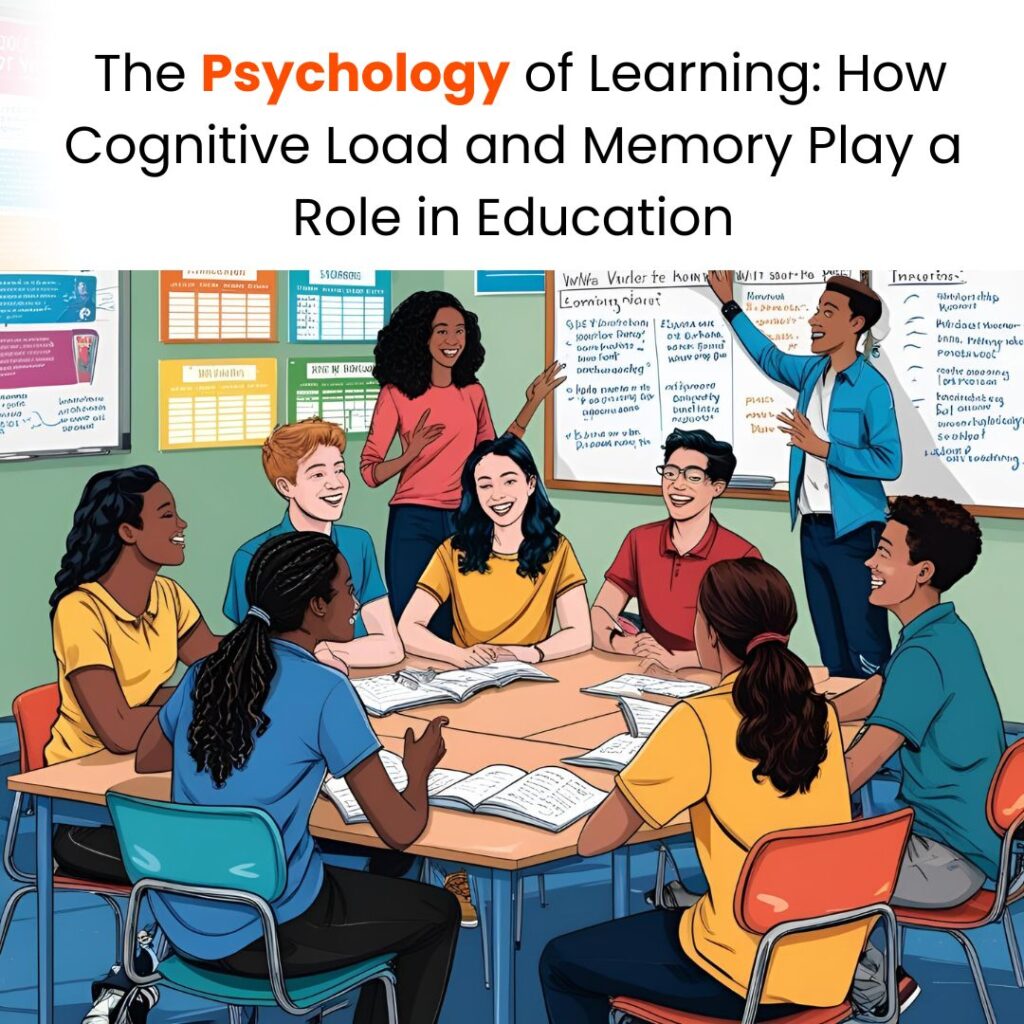Overview
The human brain understands information to learn new things. Effective learning requires an understanding of how the brain absorbs and retains information. The study of educational psychology focuses on how people learn and remember things, stressing the significance of cognitive load and processes including memory and load cognitive. These ideas are essential for education because they help develop advanced learning methods and efficient learning tactics that improve knowledge acquisition.
This article will explore the nature of cognitive memory, the impact of cognitive load, and how these combinedly influence education. Additionally, we will provide insights into practical applications and strategies to optimize learning.
What is Cognitive Memory?
The ability of the brain to store, retrieve, and process information is called cognitive memory. It plays a very important role in everyday decision-making and knowledge retention. Therefore, cognitive memory is broadly divided into three main categories.
Sensory Memory
This helps retain information for a few milliseconds. It will help the brain determine what to focus on.
Short-term Memory
This memory will hold information for immediate processing. It is referred to as working memory.
Long-term Memory
Stores information permanently and is important for the learning process. In long term memory brain takes information from the short term memory to make long term memory.
Understanding Cognitive Load
Cognitive load refers to the mental effort needed to process and store information. Our brain’s cognitive capacity is limited, and instructional designs should minimize unnecessary load. It is a fundamental concept in the psychology of learning, as excessive information overload can hinder learning for the students of any field either it be Business, IT, Medical, and ACCA globally.
Cognitive Load is classified into three types
- The inherent complexity of the material being learned is called intrinsic load.
- An Extraneous Load is the unnecessary effort caused by poor instructional design or distractions.
- Germane Load is the beneficial mental effort to integrate new knowledge with existing schemas.
Effective Learning Strategies aim to minimize the Extraneous Load.
How Cognitive Memory Helps in Education
Cognitive memory helps in education and the learning process as without it human brain cannot process information well.

today!
Role of Working Memory in Education
Different subjects require different learning and memorization in every field either ACCA or any other studies. Working memory is essential for problem-solving and understanding complex concepts. It allows students to hold and manipulate information temporarily. This type of memory is critical for subjects like mathematics and language learning.
Schemas and Knowledge Acquisition
The cognitive structures that help organize and interpret information are called schemas. They aid in knowledge acquisition by allowing learners to build upon existing knowledge, making learning more efficient.
Impact on Learning Strategies
Clear learning strategies help in understanding cognitive load. Some proven methods of impact of learning strategies
- Breaking down information into smaller, manageable parts as direct instructions.
- Use visual representation by making mind maps. It will enhance the memory retention.
- Multimedia learning includes combining text, audio, and visuals to reduce visual overload.
Preventing Brain Overload and Enhancing Memory Capacity
To prevent Brain Overload, students and educators can adopt techniques such as:
- Chunking information to fit within Memory Capacity.
- Using repetition to reinforce Long-term Memory.
- Implementing spaced repetition techniques for better recall.
Learning in Different Contexts
The application of cognitive memory principles varies across regions.
- Learning in Zimbabwe is often characterized by large class sizes, optimizing Cognitive Load through structured lessons can enhance learning.
- Learning in Maldives through digital learning tools can be integrated to facilitate online learning and minimize cognitive strain.
Benefits of Cognitive Memory
Cognitive memory provokes thinking in new dimensions or outside the box and develops problem-solving skills. Below are the advantages of it
- Enhances learning, problem-solving, and decision-making
- Improves focus and helps absorb new knowledge quickly
- Supports creativity by recalling past experiences for new ideas
- Boosts emotional intelligence by remembering social cues and past interactions
- Strengthens relationships through better communication and understanding
- Increases productivity and reduces errors in professional settings
- Aids in critical thinking and effective situation analysis
- Helps reduce stress and anxiety by improving mental organization
- It plays a key role in maintaining mental health and cognitive function.
- This can be preserved through cognitive exercises like reading and puzzles.
Conclusion
To conclude cognitive memory and cognitive load are improving educational outcomes. By applying effective learning strategies, students and educators can enhance knowledge acquisition and optimize memory capacity.
It does not matter which learning source you are using either you are using multimedia learning, mind maps, or direct instruction. Only aim is to create learning environment that promotes meaningful learning.
Frequently Asked Questions
Difference between long-term memory and short-term memory?
Long-term memory stores information permanently for future recall, while short-term memory keeps the information temporarily.
How does Working Memory impact learning?
Working memory impacts learning by helping in processing the information in real time. It is essential for problem-solving and comprehension.
How can educators reduce Information Overload in classrooms?
Educators can break information into smaller parts, use Multimedia Learning, and incorporate Direct Instruction techniques.
What role do Schemes play in education?
Schemas help organize information, allowing students to relate new knowledge to existing concepts, and improving Knowledge retention as well.
How can Online Learning optimize Cognitive Load?
Online Learning platforms can personalize content, provide interactive resources, and allow learners to pace themselves, reducing Brain Overload. By applying these tips, learners and educators can significantly improve educational outcomes while managing Cognitive Load effectively.





